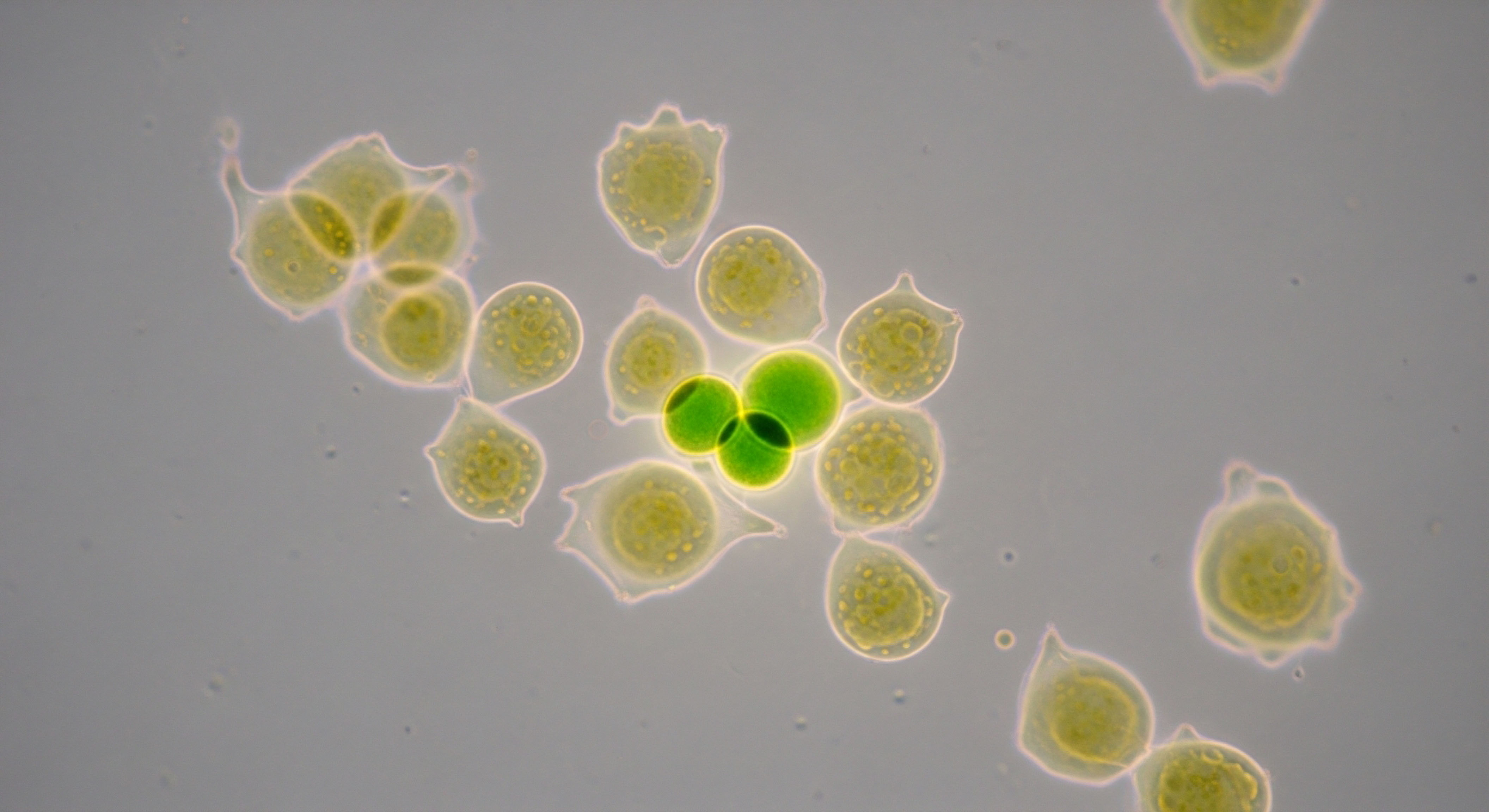

Fundamentals
Perhaps you have experienced those subtle shifts within your own body, a creeping sense that something is not quite right, even when traditional markers appear within normal ranges. It might manifest as a persistent fatigue that no amount of rest seems to resolve, or perhaps a lingering brain fog that clouds your thoughts, making simple tasks feel like navigating a dense mist.
For many, these sensations are accompanied by digestive discomfort, a bloating or irregularity that disrupts daily life, signaling a deeper imbalance. These are not merely isolated annoyances; they are often whispers from your internal systems, indicating a potential compromise in fundamental biological processes, such as the integrity of your gut barrier.
Your gut, often referred to as your second brain, is a sophisticated ecosystem, a bustling metropolis of microorganisms and specialized cells. Its primary role extends beyond digestion; it acts as a critical boundary, a selective filter between the external world of your diet and the internal sanctuary of your bloodstream.
This protective lining, known as the gut barrier, is composed of a single layer of epithelial cells tightly bound together by structures called tight junctions. When this barrier functions optimally, it permits the absorption of vital nutrients while vigilantly blocking the entry of harmful substances, undigested food particles, and microbial toxins into your systemic circulation.
As the years accumulate, this delicate intestinal lining can become less resilient. Age-related changes, alongside environmental stressors, dietary choices, and chronic low-grade inflammation, can weaken these tight junctions, leading to increased intestinal permeability. This phenomenon, colloquially termed “leaky gut,” allows undesirable elements to bypass the body’s natural defenses, triggering an immune response and contributing to systemic inflammation.
Such a state can impact various bodily systems, including the endocrine system, which orchestrates your hormonal balance. A compromised gut barrier can disrupt the delicate dance of hormones, influencing everything from thyroid function to adrenal health and the production of sex steroids.
A healthy gut barrier is essential for preventing systemic inflammation and maintaining hormonal equilibrium throughout the body.
Understanding this intricate connection between gut health and hormonal well-being is a significant step toward reclaiming vitality. When the gut barrier is compromised, the body expends considerable energy managing inflammation, diverting resources that would otherwise support optimal endocrine function.
This continuous low-level stress can contribute to symptoms commonly associated with hormonal imbalances, such as unexplained weight fluctuations, mood disturbances, and diminished energy levels. Recognizing these interconnected signals within your own physiology empowers you to seek solutions that address root causes, rather than simply managing symptoms.

What Is Gut Barrier Function?
The intestinal barrier represents a complex, dynamic interface that serves as a crucial line of defense. It comprises several components working in concert ∞ the inner mucus layer, the epithelial cell layer with its tight junctions, and the underlying immune cells. The epithelial cells themselves are not merely passive conduits; they actively participate in nutrient absorption and immune surveillance.
The tight junctions, formed by proteins such as occludin, claudins, and zonula occludens (ZO-1), regulate the paracellular pathway, controlling what passes between cells. When these proteins are disrupted, the integrity of the barrier is compromised, leading to increased permeability.
Maintaining the integrity of this barrier is paramount for overall health. A robust gut barrier ensures that the vast array of beneficial bacteria residing within your intestines remain contained, performing their vital roles in digestion, vitamin synthesis, and immune system modulation.
Conversely, a breach in this barrier can allow bacterial components, such as lipopolysaccharides (LPS), to enter the bloodstream. LPS is a potent inflammatory trigger, capable of activating systemic immune responses that can contribute to metabolic dysfunction, insulin resistance, and even neuroinflammation.

How Does Aging Affect Gut Integrity?
The aging process brings about several physiological changes that can diminish gut barrier function. There is a natural decline in the regenerative capacity of intestinal epithelial cells, making the repair process less efficient.
Additionally, the diversity and composition of the gut microbiota shift with age, often favoring less beneficial species and reducing the abundance of bacteria that produce short-chain fatty acids, which are vital for colonocyte health. Chronic low-grade inflammation, often termed “inflammaging,” also plays a significant role, contributing to the breakdown of tight junctions and perpetuating a cycle of increased permeability and systemic immune activation.
Environmental factors and lifestyle choices further influence this age-related decline. A diet lacking in fiber and nutrient density, chronic stress, certain medications, and exposure to environmental toxins can all exacerbate the weakening of the gut barrier.
These external pressures combine with intrinsic aging processes to create a scenario where the body’s protective mechanisms are gradually eroded, paving the way for systemic issues that extend far beyond the digestive tract itself. Addressing these foundational elements is a critical component of any comprehensive wellness strategy.


Intermediate
Understanding the foundational role of gut barrier function sets the stage for exploring targeted interventions. Peptide therapies represent a compelling avenue for addressing age-related decline in gut integrity, not merely by patching symptoms, but by supporting the body’s innate repair and regulatory mechanisms.
These short chains of amino acids act as precise signaling molecules, capable of influencing cellular processes in highly specific ways. Their utility in restoring systemic balance, including aspects of hormonal health and metabolic function, makes them particularly relevant to the challenge of a compromised intestinal lining.
When considering peptide therapies, it is important to recognize their diverse actions. Some peptides directly promote tissue repair and regeneration, while others modulate inflammatory pathways or influence growth hormone secretion, which indirectly supports cellular health across multiple systems. The precise application of these agents requires a thorough understanding of their mechanisms and how they integrate within a broader personalized wellness protocol. This approach moves beyond a simplistic view of isolated treatments, instead embracing the interconnectedness of biological systems.
Peptide therapies offer targeted support for gut barrier restoration by influencing cellular repair, inflammation, and systemic growth factors.

Peptide Therapies and Gut Health Support
Several peptides hold promise for their potential to support gut barrier function, either directly or through their systemic effects. These agents are often incorporated into broader hormonal optimization protocols, recognizing that gut health is inextricably linked to overall endocrine balance.
- Sermorelin ∞ This growth hormone-releasing hormone (GHRH) analog stimulates the pituitary gland to produce and secrete more natural growth hormone. Growth hormone plays a vital role in tissue repair and regeneration throughout the body, including the gastrointestinal tract. Improved cellular turnover and integrity in the gut lining can be a direct benefit of optimized growth hormone levels.
- Ipamorelin / CJC-1295 ∞ These are also GHRH mimetics, working synergistically to promote a more sustained and physiological release of growth hormone. The enhanced growth hormone pulsatility can contribute to better cellular maintenance and repair of the intestinal epithelium, supporting the tight junctions and overall barrier function.
- Tesamorelin ∞ A synthetic GHRH analog, Tesamorelin has demonstrated effects on visceral fat reduction and metabolic health. While its direct impact on gut barrier function is still being explored, improvements in metabolic parameters and reductions in systemic inflammation could indirectly benefit intestinal integrity.
- Hexarelin ∞ This peptide is a growth hormone secretagogue, similar to Ipamorelin, but with additional potential effects on cardiovascular health and tissue healing. Its capacity to stimulate growth hormone release contributes to the regenerative processes that are crucial for maintaining a healthy gut lining.
- MK-677 (Ibutamoren) ∞ An oral growth hormone secretagogue, MK-677 increases growth hormone and IGF-1 levels. The systemic anabolic and regenerative effects of elevated growth hormone can extend to the gut, promoting cellular repair and potentially strengthening the intestinal barrier over time.
Beyond growth hormone-stimulating peptides, other targeted peptides offer more direct benefits for gut health.
- Pentadeca Arginate (PDA) ∞ This peptide is recognized for its tissue repair, healing, and anti-inflammatory properties. PDA’s ability to modulate inflammatory responses and support cellular regeneration makes it a compelling candidate for directly addressing compromised gut barrier integrity. It can assist in the restoration of damaged epithelial cells and the reinforcement of tight junctions, thereby reducing intestinal permeability.
- BPC-157 ∞ While not explicitly listed in the core pillars, BPC-157 is a highly researched peptide for gut healing. It promotes angiogenesis (new blood vessel formation) and acts as a potent anti-inflammatory agent, accelerating the repair of various tissues, including the gastrointestinal lining. Its protective effects on the stomach and intestines are well-documented in preclinical studies.

Integrating Peptides with Hormonal Optimization
The effectiveness of peptide therapies in supporting gut barrier function is often amplified when integrated within a comprehensive hormonal optimization strategy. For men experiencing symptoms of low testosterone, Testosterone Replacement Therapy (TRT) protocols, typically involving weekly intramuscular injections of Testosterone Cypionate (200mg/ml), are often combined with agents like Gonadorelin (2x/week subcutaneous injections) to maintain natural testosterone production and fertility, and Anastrozole (2x/week oral tablet) to manage estrogen conversion. Optimal testosterone levels can contribute to overall tissue vitality and a reduction in systemic inflammation, indirectly supporting gut health.
For women, hormonal balance is equally critical. Protocols for pre-menopausal, peri-menopausal, and post-menopausal women may include Testosterone Cypionate (typically 10 ∞ 20 units weekly via subcutaneous injection) and Progesterone, prescribed based on menopausal status. Pellet therapy, offering long-acting testosterone, with Anastrozole when appropriate, also provides a consistent hormonal foundation. Balanced sex hormones contribute to the health of mucosal tissues throughout the body, including the gut lining, and can modulate immune responses that impact barrier integrity.
A balanced endocrine system, supported by targeted hormonal optimization, creates a more favorable environment for gut barrier repair and resilience.
The synergy between peptide therapies and hormonal optimization protocols underscores a fundamental principle of personalized wellness ∞ the body operates as an interconnected system. Addressing a compromised gut barrier without considering the broader hormonal landscape is akin to repairing a single component of a complex machine without ensuring the power supply is stable. By supporting both the specific mechanisms of gut repair with peptides and the overarching hormonal environment, a more robust and lasting restoration of vitality becomes possible.

Comparing Peptide Actions for Gut Support
The table below provides a comparative overview of how various peptides, particularly those related to growth hormone and direct tissue repair, contribute to the potential reversal of age-related decline in gut barrier function.
| Peptide | Primary Mechanism of Action | Direct/Indirect Gut Barrier Benefit | Relevance to Age-Related Decline |
|---|---|---|---|
| Sermorelin / Ipamorelin / CJC-1295 / Hexarelin / MK-677 | Stimulates natural growth hormone release | Indirect ∞ Promotes cellular regeneration, tissue repair, and reduces systemic inflammation, all beneficial for epithelial integrity. | Addresses age-related decline in growth hormone, which impacts cellular turnover and repair capacity. |
| Pentadeca Arginate (PDA) | Anti-inflammatory, tissue repair, cellular regeneration | Direct ∞ Supports epithelial cell healing, reinforces tight junctions, modulates local inflammation within the gut. | Counters chronic low-grade inflammation and reduced regenerative capacity associated with aging. |
| BPC-157 | Promotes angiogenesis, anti-inflammatory, accelerates tissue healing | Direct ∞ Aids in the repair of damaged gut lining, reduces inflammation, and supports mucosal integrity. | Addresses age-related tissue fragility and inflammatory responses that compromise the gut barrier. |
| PT-141 | Melanocortin receptor agonist, influences sexual function | Indirect ∞ No direct gut barrier benefit. Primarily for sexual health. | Not directly relevant to gut barrier decline, but part of a holistic wellness approach. |


Academic
The intricate relationship between age-related decline in gut barrier function and systemic health extends deeply into the realm of endocrinology and systems biology. A comprehensive understanding requires moving beyond superficial explanations to examine the molecular and cellular mechanisms at play. The gut barrier is not merely a physical wall; it is a dynamic immunological and metabolic organ, constantly interacting with the vast microbial community it houses and influencing distant physiological processes, including hormonal signaling.
Age-related intestinal permeability is a complex phenomenon driven by a confluence of factors. Cellular senescence, the accumulation of non-dividing cells that secrete pro-inflammatory molecules, contributes to chronic low-grade inflammation within the gut wall. This inflammation directly compromises the integrity of tight junction proteins, such as occludin and claudins, which are critical for maintaining the paracellular seal between enterocytes.
Furthermore, changes in the gut microbiota, often termed dysbiosis, lead to reduced production of beneficial short-chain fatty acids like butyrate, which serve as a primary energy source for colonocytes and possess significant anti-inflammatory properties. The diminished trophic support from these microbial metabolites further weakens the epithelial barrier.
Age-related gut barrier compromise involves cellular senescence, tight junction disruption, and microbial dysbiosis, impacting systemic physiology.

Endocrine System Interplay with Gut Barrier Function
The endocrine system, a network of glands that produce and secrete hormones, is profoundly affected by and, in turn, influences gut barrier integrity. The hypothalamic-pituitary-adrenal (HPA) axis, the body’s central stress response system, can be dysregulated by chronic inflammation originating from a compromised gut.
Elevated levels of circulating inflammatory cytokines, such as TNF-alpha and IL-6, can directly impact the hypothalamus and pituitary, altering the release of corticotropin-releasing hormone (CRH) and adrenocorticotropic hormone (ACTH), respectively. This can lead to altered cortisol rhythms, impacting metabolic regulation, immune function, and even mood.
Moreover, the gut itself is a significant endocrine organ, producing numerous hormones and neuropeptides that regulate digestion, satiety, and even brain function. A disrupted gut barrier can impair the proper signaling of these gut-derived hormones, contributing to metabolic dysfunction, including insulin resistance. The absorption of nutrients, which is fundamental for hormone synthesis and receptor sensitivity, can also be compromised, creating a cascade of deficiencies that further destabilize the endocrine milieu.

Can Peptide Therapies Reverse Age-Related Decline in Gut Barrier Function?
The question of whether peptide therapies can reverse age-related decline in gut barrier function requires a mechanistic examination of their actions. Peptides, particularly those that modulate growth hormone secretion, play a significant role in cellular regeneration and tissue repair.
Growth hormone (GH) and its downstream mediator, Insulin-like Growth Factor 1 (IGF-1), exert trophic effects on various tissues, including the gastrointestinal mucosa. Studies indicate that GH and IGF-1 can promote intestinal epithelial cell proliferation, enhance villus height, and improve crypt depth, all of which contribute to a more robust and functional gut lining.
The age-related decline in endogenous GH production, often termed somatopause, directly impacts the regenerative capacity of the gut. By stimulating the physiological release of GH, peptides like Sermorelin, Ipamorelin, and CJC-1295 offer a strategy to counteract this decline, thereby supporting the structural integrity and repair mechanisms of the intestinal barrier.
Beyond systemic growth factors, certain peptides possess direct cytoprotective and anti-inflammatory properties that are highly relevant to gut barrier restoration. Pentadeca Arginate (PDA), for instance, has been investigated for its ability to modulate inflammatory pathways and promote tissue healing.
In the context of the gut, this means PDA could directly reduce the inflammatory assault on tight junctions and accelerate the repair of damaged epithelial cells. Its actions are not solely about stimulating growth; they involve a more nuanced modulation of the local immune environment within the gut wall, fostering conditions conducive to barrier integrity. The reduction of inflammatory cytokines, which are known disruptors of tight junctions, is a critical aspect of PDA’s potential utility.
The efficacy of these peptides is not isolated; it is often enhanced by their integration into a broader therapeutic framework that addresses underlying hormonal imbalances. For instance, optimizing testosterone levels in men through Testosterone Replacement Therapy (TRT) can reduce systemic inflammation and improve overall tissue vitality.
Testosterone has been shown to have immunomodulatory effects, and its optimization can contribute to a less inflammatory internal environment, which is beneficial for gut barrier integrity. Similarly, in women, balanced levels of estrogen and progesterone, achieved through precise hormonal optimization protocols, contribute to mucosal health throughout the body, including the gastrointestinal tract. Estrogen receptors are present in the gut, and adequate estrogen levels can support the health and regeneration of intestinal epithelial cells.
The challenge lies in the multifactorial nature of age-related gut barrier decline. While peptides offer targeted support for cellular repair and inflammation, a holistic approach must also consider dietary interventions, stress management, and the judicious use of probiotics and prebiotics to restore microbial balance. The synergistic application of these strategies, guided by a comprehensive understanding of an individual’s unique biological landscape, holds the greatest promise for truly reversing the decline and restoring optimal gut barrier function.

How Do Hormonal Imbalances Impact Gut Permeability?
Hormonal imbalances can significantly influence gut permeability through various mechanisms. Cortisol, the primary stress hormone, when chronically elevated, can directly impair tight junction integrity. Prolonged stress responses, mediated by the HPA axis, lead to increased intestinal permeability, creating a vicious cycle where a leaky gut perpetuates systemic inflammation, which in turn exacerbates stress responses.
Sex hormones also play a considerable role. Estrogen, for example, influences the gut microbiota composition and diversity, and fluctuations during perimenopause or post-menopause can alter the gut environment, potentially contributing to dysbiosis and increased permeability. Thyroid hormones are also critical for gut motility and digestive enzyme production; hypothyroidism can slow gut transit, leading to bacterial overgrowth and subsequent barrier compromise.
The intricate feedback loops between the endocrine system and the gut underscore the importance of a systems-based approach. Addressing hormonal deficiencies or excesses is not merely about alleviating specific symptoms; it is about restoring a foundational balance that supports the integrity of critical barriers, such as the gut lining. This integrated perspective allows for a more comprehensive and lasting resolution to age-related health challenges.
| Hormone/Axis | Mechanism of Gut Barrier Influence | Clinical Relevance to Age-Related Decline |
|---|---|---|
| Growth Hormone / IGF-1 | Promotes epithelial cell proliferation, villus height, crypt depth; supports tissue repair. | Age-related somatopause reduces regenerative capacity, leading to thinner, less resilient gut lining. Peptides can counteract this. |
| Cortisol (HPA Axis) | Chronic elevation impairs tight junction integrity, increases inflammation. | Prolonged stress and age-related HPA axis dysregulation contribute to persistent gut permeability. |
| Sex Hormones (Estrogen, Testosterone) | Influence gut microbiota, mucosal health, immune modulation. | Declining sex hormone levels with age can alter gut environment, reduce mucosal integrity, and increase inflammatory susceptibility. |
| Thyroid Hormones | Regulate gut motility and digestive enzyme function. | Hypothyroidism, more common with age, can lead to slowed transit, dysbiosis, and barrier compromise. |

What Role Does Systemic Inflammation Play in Gut Barrier Compromise?
Systemic inflammation, often a silent companion to aging, acts as a relentless assailant on the gut barrier. This chronic, low-grade inflammatory state, driven by factors such as accumulated cellular damage, metabolic dysfunction, and persistent immune activation, directly targets the delicate tight junctions that maintain intestinal integrity.
Inflammatory cytokines, including TNF-alpha, IL-1 beta, and IL-6, are known to disrupt the expression and localization of key tight junction proteins, effectively prying open the cellular gates of the intestinal lining. This breach allows a continuous influx of microbial products and undigested food antigens into the bloodstream, perpetuating and escalating the systemic inflammatory burden.
The cycle is self-reinforcing ∞ systemic inflammation weakens the gut barrier, and a compromised gut barrier fuels further systemic inflammation. This creates a challenging environment for the body’s repair mechanisms and significantly impacts overall metabolic and hormonal health. Interventions that reduce systemic inflammation, whether through targeted peptides, hormonal optimization, or lifestyle modifications, are therefore critical for restoring and maintaining a robust gut barrier.

References
- Rao, R. & Samak, A. (2012). Role of Tight Junctions in Maintaining Integrity of Intestinal Epithelium. In ∞ Rajendram, R. Preedy, V.R. Patel, V.B. (eds) Diet and Exercise in Cystic Fibrosis. Humana Press.
- Ohland, C. L. & Macnaughton, W. K. (2010). Probiotic bacteria and intestinal barrier function. American Journal of Physiology-Gastrointestinal and Liver Physiology, 298(6), G807-G819.
- Vancamelbeke, M. & Vermeire, S. (2017). The intestinal barrier ∞ a biological shield with an emerging role in inflammatory bowel disease. Genes, 8(12), 398.
- O’Connor, J. C. et al. (2009). The role of inflammation in the neurobiology of depression ∞ mechanistic concepts and therapeutic implications. Current Opinion in Pharmacology, 9(1), 23-28.
- Walker, A. W. et al. (2011). The gut microbiota as a key regulator of host metabolism. Nature Reviews Endocrinology, 7(10), 587-596.
- Schwarz, S. et al. (2010). Growth hormone and the gut. Best Practice & Research Clinical Endocrinology & Metabolism, 24(3), 473-482.
- Orlando, R. C. (2010). Esophageal epithelial barrier function. Current Opinion in Gastroenterology, 26(4), 368-372.
- Camilleri, M. (2021). Leaky gut ∞ mechanisms, measurement and clinical implications. Gut, 70(11), 2206-2215.
- Kelly, J. R. et al. (2015). The microbiome-gut-brain axis ∞ from basic principles to clinical applications. Journal of Neuroendocrinology, 27(3), 301-317.
- Konturek, S. J. et al. (2004). Ghrelin, a new gastrointestinal hormone. Journal of Physiology and Pharmacology, 55(3), 521-534.

Reflection
As you consider the intricate dance between your gut barrier, hormonal systems, and overall vitality, perhaps a new perspective on your own health journey begins to form. The symptoms you experience are not random occurrences; they are signals from a deeply interconnected biological system. Understanding the mechanisms by which age, lifestyle, and even the microscopic inhabitants of your gut influence your well-being is not merely academic; it is a profound act of self-discovery.
This knowledge is a starting point, a compass guiding you toward a more personalized path to wellness. Your unique biological blueprint demands a tailored approach, one that respects the complexity of your internal landscape. The journey toward reclaiming vitality is deeply personal, requiring careful consideration and guidance. What steps will you take to honor your body’s signals and support its innate capacity for balance and repair?



